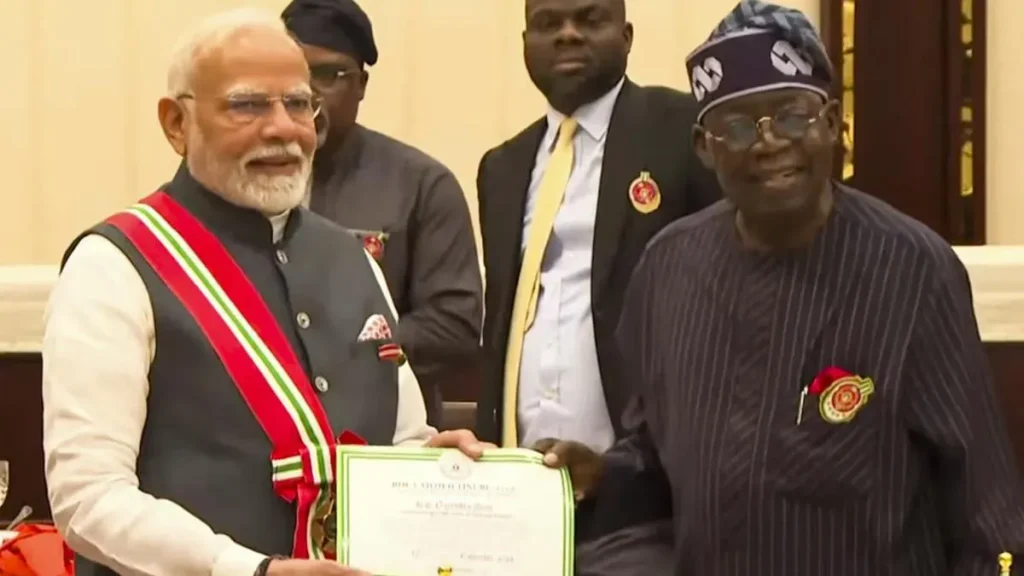Context:
Recently, the Prime Minister of India (PM) Narendra Modi visited Nigeria (Africa).
More on News:
- Nigeria conferred it’s the Grand Commander of the Order of the Niger, to Prime Minister Narendra Modi.
- During the visit, the three MoUs were signed in cultural exchange, customs cooperation, and survey cooperation.
- The visit underlines India’s interest in developing defence cooperation, trade, and technology transfer.
About India-Nigeria Relations
(I) Historical Background:
- India and Nigeria have had historical interconnections dating back to the 16th century with trade and cultural exchange.
- Post-independence: Both countries were free in the period 1940s-50s; their relation with India was strengthened in the 1960s, in the process of decolonization.
- Cultural & Education Exchange: India supported Nigerian independence and post-independence development; educational exchange started and many Nigerians started coming to India for education.
- Strategic Cooperation: The two countries have cooperated in regional and international affairs, particularly through the UN and Non-Aligned Movement.
(II) Strategic and Economic Relations:
- Trade partnership: India is Nigeria’s second-largest trading partner, with bilateral trade standing at $7.9 billion.
- The bilateral trade volume between India and Nigeria has decreased from $14.95 billion in 2021-22 to $7.89 billion in 2023-24.
- India exports pharmaceuticals, textiles, machinery, and food products to Nigeria.India imports crude oil from Nigeria but does not have upstream assets there.
- The number of Indian companies surpasses 150 in Nigeria, amounting to $27 billion. India has the most important footprint in Nigeria’s manufacturing and service sectors.
- The Indian Diaspora in Nigeria comprises approximately 60,000 people and is a key influence on further strengthening bilateral relations.
(III) Defence and Security Cooperation:
- India has offered various defence training opportunities to several Nigerian officers in the areas of defence and counter-insurgency.
- Shared security concerns about Boko Haram insurgency, piracy in the Gulf of Guinea, and oil theft present opportunities for enhanced cooperation.
- India can assist in countering terrorism through joint exercises, technology transfer, and intelligence sharing-including satellite surveillance and cybersecurity.
(IV) Economic Cooperation and Development Assistance:
- India has granted development assistance to Nigeria by way of concessionary loans as well as capacity-building programs in technical fields ($100 million).
- Healthcare, education, renewable energy, and infrastructure development have also been the focus areas in cooperation.
- India could collaborate with Nigeria in IT, health care, and agricultural development to support Nigeria’s economic transformation and enhance job creation.
(V) Trade and Investment Potential:
- Despite the recent decline in trade growth, there remains an uncovered possibility to boost the exportation of pharmaceuticals, foodstuff, and clothing, among others.
- India would take up the possibility of rupee trade arrangements that would bypass the Nigerian Foreign Exchange shortages and, as such, boost trade volumes.
Significance of Nigeria for India:
- Nigeria is serving as a cornerstone of its engagement with Africa.
- Politically, Nigeria is Africa’s most populous nation and largest economy, a regional leader in West Africa, and a pivotal player in the African Union.
- “Nigeria is the lynchpin of India’s Africa strategy,” which reflects its role in facilitating India’s outreach in the African continent.
- Economically, Nigeria is a critical energy partner for India, supplying over 8% of its crude oil imports, essential for India’s energy security.
- Nigeria’s natural gas potential aligns with India’s growing demand for clean energy and fosters long-term energy cooperation.
- Nigeria supports India’s aspirations for a permanent United Nations Security Council seat, which strengthens global South solidarity.
Common Challenges
- Economical: India and Nigeria are imbalanced. India heavily imports Nigerian crude oil, while Nigeria’s access to Indian markets for non-oil goods remains limited.
- Security concerns: Indian businesses operating in Nigeria sometimes face risks such as insurgencies in the Niger Delta, piracy, and corruption.
- Dominance of China: Competition from China in Africa, including Nigeria, presents a geopolitical challenge for India. While China’s significant investments in Nigerian infrastructure and industries pose a competitive edge.
- Bureaucratic Delay: India’s African outreach, including Nigeria, often suffers from bureaucratic delays and insufficient follow-through, which hinder deeper cooperation.
Some Initiatives
- The Pan-African e-Network Project is a significant initiative that enhances Nigeria’s access to telemedicine and e-learning powered by Indian technology.
- Indian Technical and Economic Cooperation (ITEC): India has supported capacity-building through scholarships and training programs. Nigerian students pursuing higher education in India contribute to people-to-people ties.
Conclusion
Both nations must collaborate in multilateral forums such as the UN to champion global South solidarity. A proactive and inclusive approach can solidify the India-Nigeria partnership in a rapidly evolving world order.

